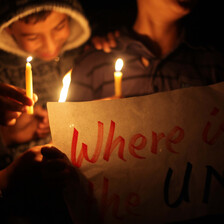The Electronic Intifada Gaza Strip 19 December 2013

There’s no sign that life in Gaza is returning to normal.
APA imagesAfter fifty days, is Gaza’s latest power crisis coming to an end?
On Sunday, the Palestinian Authority in the occupied West Bank sent a shipment of 450,000 liters of fuel to run Gaza’s only power plant. The fuel comes from Israel but the consignment has been financed by Qatar.
Despite the delivery, the problems persist. So does my own anxiety.
I am writing these words late at night. We have had our electricity turned back on in my home in al-Maghazi refugee camp — after a power outage of nearly 11 hours.
The power cut started shortly after noon — at the moment my children began to return home from school. I want them to have lighting to do their homework, so I saved some for them in an uninterruptible power supply (UPS) battery. Then I drove to a nearby town.
I sat down in a coffee shop. It was a sunny day, a welcome change from the severe storms we had last week.
Trying to remain patient
I did some work in the coffee shop, hoping that power would soon be restored to my family. No such luck. When I got back home, I had to postpone my own work, so that my children could attend to their revisions. The storm meant that they lost four days of school, so I want them to catch up.
Shortly before 7pm, my UPS battery ran out. My son Mohammed was still busy with his homework at the time.
I tried to remain patient, hoping that electricity would be returned swiftly, as the power company had promised. Within an hour, though, we were plunged into darkness.
Mohammad picked up his mother’s cell phone, using its light to resume his homework. I went out in the street to collect a light from a nearby store. I got one for Mohammad, too. He looked up at me and smiled as I gave it to him.
It got colder. Since the storm, all of my children gather together in the same room, to try and stay warm. We can’t turn on an electric heater because of the power cuts.
The Qatar-funded fuel is supposed to reduce the power cuts to eight hours per day. Until now, they have generally lasted for 12 to 16 hours. Sometimes we have been without power for 18 or 20 hours.
Preoccupied
Normal life — life before the latest power crisis — is hard enough in Gaza. So far there are no signs we are returning to normal life.
Instead of being able to think about work and raising our families or being able to enjoy ourselves, we are preoccupied with finding enough power to meet our basic needs.
What have I done to deserve being deprived of electricity? Like tens of thousands of other heads of households, I regularly pay bills to the Gaza electricity company.
Moreover, thousands of private sector workers, as well as businesses, UN staff and nongovernmental organizations pay their electricity bills.
This raises a fundamental question: where does our money go?
Fatah, which runs the Palestinian Authority, and the Hamas-led administration in Gaza have had a long row about who is responsible for the electricity problem.
Hamas says that taxes levied on the industrial fuel required for the Gaza power plant are too expensive. Why should Gaza’s 1.7 million people be left without electricity because of a tax dispute?
Grateful for storm?
Are we supposed to be grateful for the storm that damaged numerous Palestinian homes last week? It was in response to this extreme weather that Qatar funded the delivery of fuel here.
If we are to resist the siege of Gaza and the occupation of Palestine, we need electricity.
For us to be able to resist, we must have light and power. Without it, our children can’t do their homework properly, our doctors can’t perform many operations and our journalists are hampered from telling the world the truth about Gaza.
We face many vital tasks. Completing them is extremely difficult if we constantly have to search for light on a dark street.
Rami Almeghari is a journalist and university lecturer based in the Gaza Strip.





